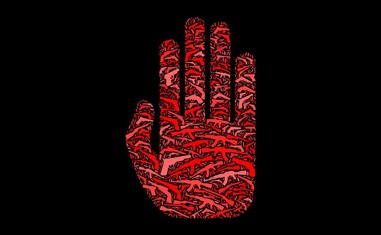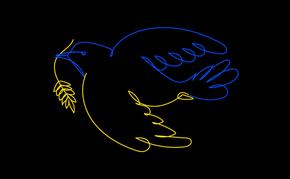The views expressed in our content reflect individual perspectives and do not represent the authoritative views of the Baha'i Faith.
“That’s a deadly weapon you’re holding,” Dad said to me one Saturday when I was 8 years old. “Treat it respectfully, always assume it’s loaded, and never point it at anything you don’t intend to kill.”
My father, a World War II Marine combat veteran, wanted me, his oldest son, to learn how to use a weapon safely and properly. I could tell from his tone of voice and his demeanor that he meant what he said, so I tried to follow his instructions very carefully.
RELATED: Veterans Day: Let’s Call it Armistice Day Again
After his extended safety class, and after an even longer tutorial on how to load, unload, take apart, clean, and reassemble a .22 caliber rifle, we went out into the countryside so I could learn how to shoot. He set up some old cans and bottles, and after an afternoon of wasted ammunition I managed to hit one, sometimes.
The next day I went to church in our little farming town in rural Washington state. Fresh from learning how to kill something, I distinctly remember the sermon that day on the Sixth Commandment.
Our Lutheran pastor said “the Sixth Commandment is not ‘Thou shall not kill’ but rather, ‘You shall not murder’ and killing and murder are not the same thing at all. Our soldiers kill the enemy, after all. Murder is killing someone who doesn’t deserve to die.”
That did not seem true to me at all – in fact, my heart and soul completely rebelled when I heard it. I had been reading the King James translation of the Bible, and although I was only eight years old, I clearly remembered that exact commandment. It said, right in Exodus 20:13 in four simple words, “Thou shalt not kill.”
For the very first time, that sermon made me began to question what I heard in church. Before, I had believed everything the pastor said, but now I had begun to use my own reasoning. This marked a major departure. I remember thinking “That’s only his interpretation. He’s actually trying to change the commandment!”
So that Sunday I resolved to always question the conclusions others made, especially about religion and morality, and do my own investigating – which turned out, a decade later, to be one of the primary principles of my newly-adopted religion, the Baha’i Faith:
… know ye that God has created in man the power of reason, whereby man is enabled to investigate reality. God has not intended man to imitate blindly his fathers and ancestors. He has endowed him with mind, or the faculty of reasoning, by the exercise of which he is to investigate and discover the truth, and that which he finds real and true he must accept. He must not be an imitator or blind follower of any soul. He must not rely implicitly upon the opinion of any man without investigation; nay, each soul must seek intelligently and independently, arriving at a real conclusion and bound only by that reality.
That passage, from a speech Abdu’l-Baha gave in Massachusetts in 1912, not only confirmed what I already believed but led me to question the way I was raised and the things my own father taught me.
My father taught me that war was a natural and inevitable outcome of being human. He said “We’ve always had wars, and we always will.”
I rejected that belief, and have worked throughout my entire adulthood for peace.
My father taught me that men should be armed and ready to fight, and I have never approached life that way.
My father taught me that everyone needed to own a gun, and I do not own a gun.
In this age of intense debate and polarization around the issue of guns, however, I don’t condemn those who own weapons, either. I’ve made my own conscious choice, and they’re free to make their choices, as well – as long as those choices don’t involve breaking the 6th commandment, which Baha’u’llah reiterated in his Most Holy Book in even more acute terms:
Let none contend with another, and let no soul slay another; this, verily, is that which was forbidden you … What! Would ye kill him whom God hath quickened, whom He hath endowed with spirit through a breath from Him? Grievous then would be your trespass before His throne! Fear God, and lift not the hand of injustice and oppression to destroy what He hath Himself raised up …
RELATED: Preventing Mass Shootings: Does Religion Have a Role?
This strong admonition has ample precedent in each of the world’s major religions. Every prophet and holy messenger commanded us not to kill one another. Yes, some subsequent followers of those prophets, and even the clergy and officials of many religions, broke those laws and attempted to find ways to justify killing, just as my childhood pastor tried to do. But none of God’s messengers ever taught us to murder one another:
Why should we kill our fellow creatures? If this warfare and strife be for the sake of religion, it is evident that it violates the spirit and basis of all religion. All the divine Manifestations have proclaimed the oneness of God and the unity of mankind. They have taught that men should love and mutually help each other in order that they might progress. Now if this conception of religion be true, its essential principle is the oneness of humanity. The fundamental truth of the Manifestations is peace. This underlies all religion, all justice. The divine purpose is that men should live in unity, concord and agreement and should love one another. Consider the virtues of the human world and realize that the oneness of humanity is the primary foundation of them all. Read the Gospel and the other Holy Books. You will find their fundamentals are one and the same. Therefore, unity is the essential truth of religion and, when so understood, embraces all the virtues of the human world. … Therefore, we must endeavor to promulgate and practice the religion of God which has been founded by all the Prophets. And the religion of God is absolute love and unity.
This profound paragraph, from an address Abdu’l-Baha gave at Columbia University in New York City in 1912, is much more than a simple admonition – it promises us a peaceful way of life without weapons.
You May Also Like
Comments

















There is no limit to the study of the Cause. The more we read ...the writings the more truths we can find in them the more we will see that our previous notions were erroneous."
(From a letter written on behalf of Shoghi Effendi to an individual believer, August 25, 1926)